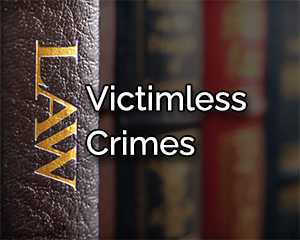 Are They Really “Crimes Against Society?”
Are They Really “Crimes Against Society?”
Victimless crimes are defined as those in which all parties consent and no party is injured. The classification is widely asserted, often argued and seldom definitive.
The concept of victimless crime is often associated with vice – activities widely considered immoral by predominant social standards. Gambling, prostitution, and unlawful drug use are widely recognized as vices.
Yet not all vices are illegal. Gluttony might be a vice but there’s no law against eating too much dessert. Among vices that are illegal, some are lawful in one state but unlawful in another. Nevada licenses prostitution, but Oklahoma prosecutes prostitution as a crime. Oklahoma severely limits the use of medical marijuana, while Colorado licenses all sales of marijuana to consenting adults.
Some crimes such as DUI might be considered victimless in as much as nobody is harmed, per se, by the mere act of driving under the influence. Prosecutors and lawmakers argue drunken driven eventually results in harm, even though not every unlawfully intoxicated driver gets involved in car crashes.
Some argue that prostitution tends to victimize those who sell their involvement in sexual activity. Others might argue prostitution and drug use harm society in general; for example, by enticing others to waste their time and energy on activities that are likely to degrade their quality of life. Such victimless crimes deprive society of participants’ best contribution to society, some argue. It is sometimes argued that a market for illegal vice indirectly imposes a burden of violence and fear on others not directly associated with illegal markets.
Criminal defense attorneys might tend to embrace more libertarian views toward victimless crimes. Acts between consenting adults primarily affect those involved. Society has no rightful role regulating perceived morality of individuals, they would argue. Trends toward decriminalization of once illegal sex acts such as sodomy or homosexuality reflects a trend among governments away from regulating morality.
Reforms Target Victimless Crimes
The trend toward decriminalizing victimless crimes might be gaining momentum, but in Oklahoma, legal action involving victimless crimes remains deeply entrenched among law enforcement, prosecutors, and lawmakers. Reduced penalties for marijuana possession were driven by voter sentiment, not by any trend away from a larger-than-life sense of moral mission among some police and prosecutors.
Before we leave the topic – and stipulating that victimless crimes are a loosely woven category – we can address two related concepts. Attempted crimes that would otherwise be property crimes or crimes against persons if completed are not considered victimless crimes. Failure to complete a crime against a victim does not make it a victimless crime. The target was, at least theoretically, psychologically victimized by the attempt.
Nor are crimes against justice systems usually treated as victimless crimes. Perjury, fleeing a police officer or resisting arrest undermine systems society relies on to maintain order, so many theorists classify them as crimes against public justice. Oklahoma statutes set apart several “crimes against public justice” in Chapter 19 of Title 21.
Some theorists likewise claim there are no victimless crimes – they would argue this group of offenses comprise crimes against society because they threaten the social order. We will leave it to the theorists to argue those questions. We classify these as “crimes for which you need a good criminal defense attorney.”
Strategy Session: Tulsa Criminal Attorney
If you have been charged with drug possession, sale of illegal drugs, prostitution, illegal gambling, or any offense considered a victimless crime, contact a Tulsa criminal attorney at Wirth Law Office to explore your options in an initial strategy consultation. Call 918-879-1681 or send your question using the form at the top of this page.


